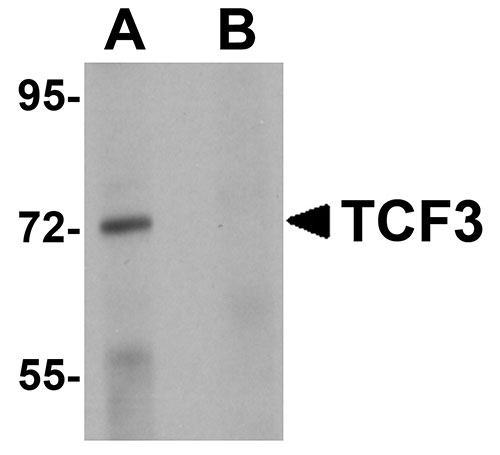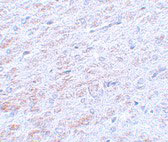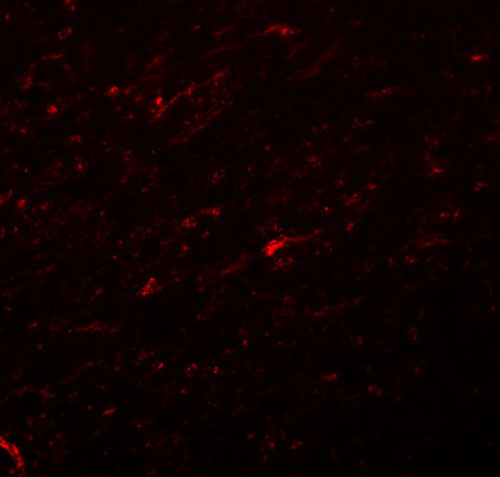TCF3 Antibody
- SPECIFICATION
- CITATIONS
- PROTOCOLS
- BACKGROUND

Application
| WB, IHC-P, IF, E |
|---|---|
| Primary Accession | P15923 |
| Other Accession | NP_003191, 27777636 |
| Reactivity | Human, Mouse, Rat |
| Host | Rabbit |
| Clonality | Polyclonal |
| Isotype | IgG |
| Calculated MW | 67600 Da |
| Application Notes | TCF3 antibody can be used for detection of TCF3 by Western blot at 1 µg/mL. Antibody can also be used for immunohistochemistry starting at 5 µg/mL. For immunofluorescence start at 20 µg/mL. |
| Gene ID | 6929 |
|---|---|
| Target/Specificity | TCF3; |
| Reconstitution & Storage | TCF3 antibody can be stored at 4℃ for three months and -20℃, stable for up to one year. As with all antibodies care should be taken to avoid repeated freeze thaw cycles. Antibodies should not be exposed to prolonged high temperatures. |
| Precautions | TCF3 Antibody is for research use only and not for use in diagnostic or therapeutic procedures. |
| Name | TCF3 |
|---|---|
| Synonyms | BHLHB21, E2A, ITF1 |
| Function | Transcriptional regulator involved in the initiation of neuronal differentiation and mesenchymal to epithelial transition (By similarity). Heterodimers between TCF3 and tissue-specific basic helix- loop-helix (bHLH) proteins play major roles in determining tissue- specific cell fate during embryogenesis, like muscle or early B-cell differentiation (By similarity). Together with TCF15, required for the mesenchymal to epithelial transition (By similarity). Dimers bind DNA on E-box motifs: 5'-CANNTG-3' (By similarity). Binds to the kappa-E2 site in the kappa immunoglobulin gene enhancer (PubMed:2493990). Binds to IEB1 and IEB2, which are short DNA sequences in the insulin gene transcription control region (By similarity). |
| Cellular Location | Nucleus. |

Thousands of laboratories across the world have published research that depended on the performance of antibodies from Abcepta to advance their research. Check out links to articles that cite our products in major peer-reviewed journals, organized by research category.
info@abcepta.com, and receive a free "I Love Antibodies" mug.
Provided below are standard protocols that you may find useful for product applications.
Background
TCF3 Antibody: The TCF3 gene, also called E2A, encodes two basic helix-loop-helix (bHLH) transcription factors, E12 and E47, through alternative splicing. These transcription factors are involved in mediating canonical Wnt signaling, which is very important in a diverse array of cellular functions such as stem cell proliferation, self-renewal, activation, fate determination, differentiation and aging and senescence. They bind beta-catenin and can act as transcriptional activators or repressors for Wnt target genes, and have been shown to regulate specific target genes during CNS development downstream of Wnt signaling. TCF3/Lef complexes are also known to play key roles in controlling cell fate lineages in multipotent skin stem cells.
References
Korinek V, Barker N, Willert K, et al. Two members of the Tcf family implicated in Wnt/beta-catenin signaling during embryogenesis in the mouse. Mol. Cell Biol.1998; 18:1248-1256.
Gribble SL, Kim HS, Bonner J, et al. Tcf3 inhibits spinal cord neurogenesis by regulating sox4a expression. Dev. Cell2009; 136:781-9.
Cole MF, Johnstone SE, Newman JJ, et al. Tcf3 is an integral component of the core regulatory circuitry of embryonic stem cells. Genes Dev.2008;22:746-55.
Nguyen H, Rendl M and Fuchs E. Tcf3 governs stem cell features and represses cell fate determination in skin. Cell2006; 127:171-83.
If you have used an Abcepta product and would like to share how it has performed, please click on the "Submit Review" button and provide the requested information. Our staff will examine and post your review and contact you if needed.
If you have any additional inquiries please email technical services at tech@abcepta.com.













 Foundational characteristics of cancer include proliferation, angiogenesis, migration, evasion of apoptosis, and cellular immortality. Find key markers for these cellular processes and antibodies to detect them.
Foundational characteristics of cancer include proliferation, angiogenesis, migration, evasion of apoptosis, and cellular immortality. Find key markers for these cellular processes and antibodies to detect them. The SUMOplot™ Analysis Program predicts and scores sumoylation sites in your protein. SUMOylation is a post-translational modification involved in various cellular processes, such as nuclear-cytosolic transport, transcriptional regulation, apoptosis, protein stability, response to stress, and progression through the cell cycle.
The SUMOplot™ Analysis Program predicts and scores sumoylation sites in your protein. SUMOylation is a post-translational modification involved in various cellular processes, such as nuclear-cytosolic transport, transcriptional regulation, apoptosis, protein stability, response to stress, and progression through the cell cycle. The Autophagy Receptor Motif Plotter predicts and scores autophagy receptor binding sites in your protein. Identifying proteins connected to this pathway is critical to understanding the role of autophagy in physiological as well as pathological processes such as development, differentiation, neurodegenerative diseases, stress, infection, and cancer.
The Autophagy Receptor Motif Plotter predicts and scores autophagy receptor binding sites in your protein. Identifying proteins connected to this pathway is critical to understanding the role of autophagy in physiological as well as pathological processes such as development, differentiation, neurodegenerative diseases, stress, infection, and cancer.




